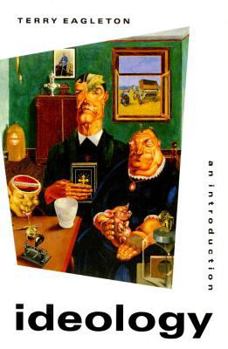Ideology: An Introduction
Select Format
Select Condition 
Book Overview
Ideology has never before been so much in evidence as a fact, and so little understood as a concept, as it is today. In this now classic work, originally written for both students and for those... This description may be from another edition of this product.
Format:Paperback
Language:English
ISBN:0860915387
ISBN13:9780860915386
Release Date:April 1991
Publisher:Verso
Length:242 Pages
Weight:0.91 lbs.
Dimensions:0.7" x 6.0" x 9.2"
Customer Reviews
2 ratings
Illuminating on ideology & its intellectual history
Published by Thriftbooks.com User , 21 years ago
The subtitle to this book reads 'an introduction', but I doubt that your typical undergraduate student would find this a useful introductory text. Rather being a bland, dispassionate catalogue of various views on ideology, Eagleton's book is a lively and even at time virulent debate with the long line of intellectuals who have sought to conceptualize ideology from the likes of Marx, Schopenhauer, Lukács, Althusser, etc.At its core, the enterprise contained with the books stands as a defense of the Marxist critical tradition against post-modernism and relativism-meaning that he desires to preserve the notion of ideology as a critical device for emancipation from false beliefs and mental processes that reinforce social oppression. Thus, after its initial chapters covering the usage of the term 'ideology' in speech and the social manifestations of ideological strategies, the Marxist debates take the forefront of the discussion almost entirely. In the final pages, Eagleton attempts to rebuff post-modern and neo-Marxist erosions of the viability of the concept of ideology. If you never considered Marxism to be the school of thought with the most invested interest in preserving the notion of 'ideology', a reading of this book will suggest strongly to the contrary.Eagleton has not only an incredible talent for not only conveying his argument in a lucid, witty and convincing manner, but also in presenting the position of diverse authors with whom he interacts. He thus proves himself not only to be an excellent mind and author but also a superb reader.
Slugs it out with difficult material
Published by Thriftbooks.com User , 24 years ago
This is a difficult, but rewarding book for readers interested in the concept of ideology in a postmodern environment. Essentially, ideology means false societal beliefs that become institutionalized so they can serve the interests of a ruling class. Ideological beliefs are like propaganda, but differ in being much more deeply embedded in how a person thinks about the society he or she lives in. Thus, for those of us who are Americans, we all tend to have certain beliefs about the nature of the democracy we live in. Beliefs that structure the way we act, like being duty-bound to go to the polls to elect our leaders. Critics, on the other hand, might point out how these beliefs actually work against most people and for the hidden interests of those elites who really hold power in America. If the critic is right, then those beliefs would be ideological ones and represent a "false consciousness" about democracy-in-America's true nature.There is a conceptual issue that arises with the notion of ideology. It implies at its heart that there are objective truths in the world that do not depend on our idea of them in order for them to be true. On a more extreme view, it can mean there are absolute truths that cannot be relativized to any person, group, or time period. The natural sciences were long held as our only reliable source of these objective truths. Thus, the early supporters of the idea of ideology believed that by using scientific methods, the false beliefs of ideology could be unmasked or exposed. However, since the time of the early Greeks there have been thinkers who challenged the idea of objective truth. Truth, these skeptics argue, is in the eye of the beholder. Thus science, for one, discloses no inner truths about the world; it only aids us in remaking things in ways that satisfy the needs of the more powerful among us. The issue that non-skeptics like Eagleton must confront is that without a clear concept of objective truth, the whole idea of ideology seems impossible. The problem for our historical period is that the climate is dominated by a skepticism toward objective truths, making the concept of ideology very unfashionable. Eagleton would like to rescue false consciousness from the current version of skepticism (postmodernism), which is what the book is mainly about. He examines the various positions that both defenders of the concept (Marx, Lukasz, Althusser) and its critics (Nietzsche, Rorty, Derrida), among others, have taken over the years. So far as I can tell, Eagleton presents no new theory of his own. Instead he uses some forceful examples to illustrate the underlying practical value the idea of false consciousness has for us all. Certainly some background in philosophy is needed to navigate these difficult routes. But if you agree that many of our most embedded and structured beliefs serve the interests of others instead of ourselves, and that we do not come by these beliefs ac






